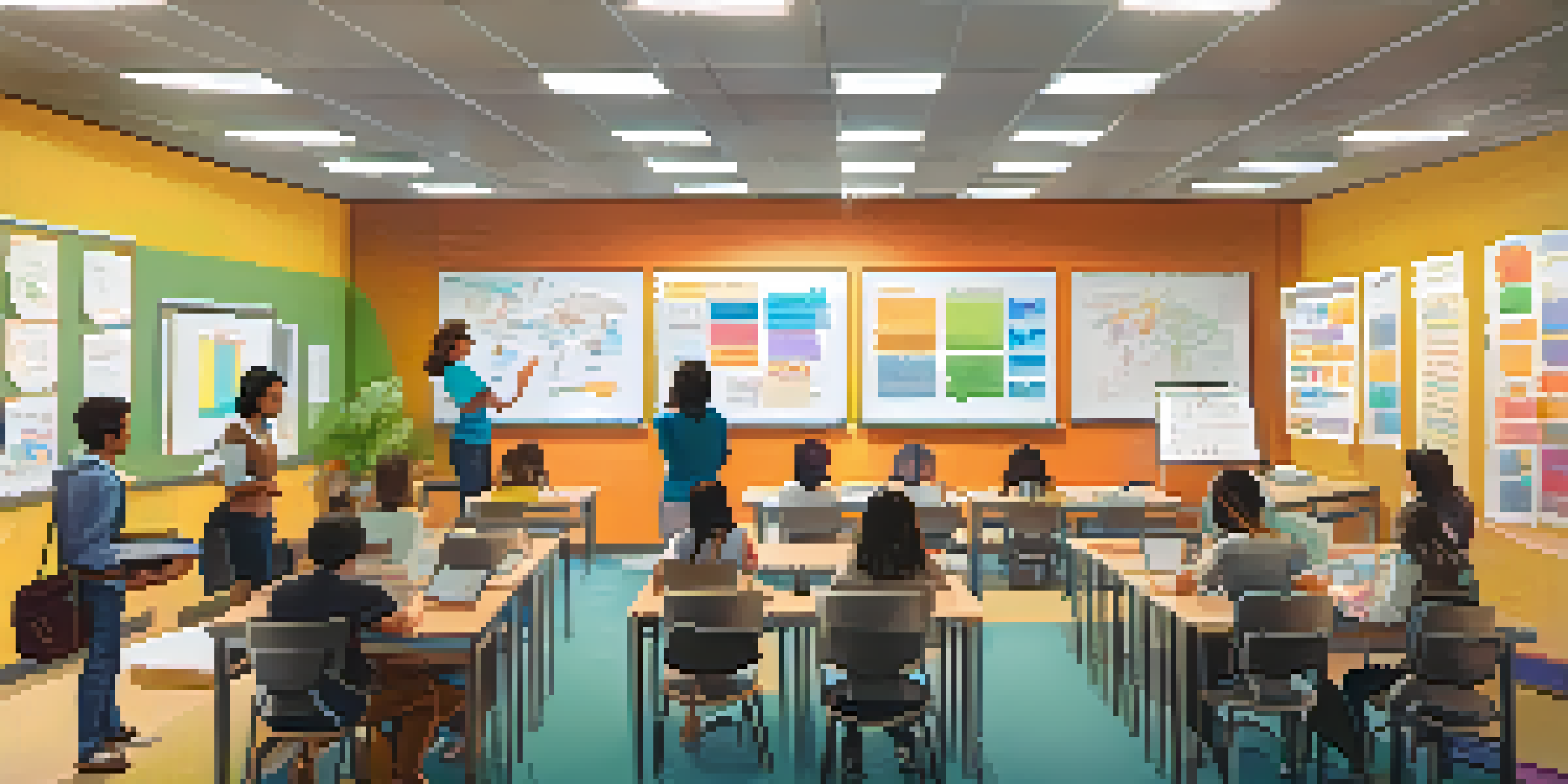Fostering Innovation through Teacher Professional Learning

Understanding the Role of Professional Learning in Education
Professional learning is essential for educators looking to enhance their teaching methods and stay current with educational trends. By participating in workshops, seminars, and collaborative learning environments, teachers can develop new skills and strategies that benefit their students. This ongoing learning process creates a culture of innovation within schools, as teachers share insights and best practices.
Education is the most powerful weapon which you can use to change the world.
When teachers engage in professional learning, they not only improve their own skills but also contribute to a community of practice that fosters collective growth. This collaborative approach helps to break down silos between subjects and grades, leading to a more integrated educational experience for students. In essence, professional learning transforms not just individual teachers but the entire school environment.
Moreover, as educators embrace new pedagogical approaches, they can inspire their students to think creatively and critically. An innovative teaching staff can ignite a passion for learning that resonates with students, encouraging them to explore ideas and develop their own creative solutions. Thus, professional learning serves as a catalyst for both teacher and student success.
The Importance of Collaborative Learning Communities
Collaborative learning communities provide an invaluable platform for teachers to share experiences and insights. These groups often meet regularly to discuss challenges, brainstorm solutions, and celebrate successes, creating a supportive environment for innovation. By working together, educators can pool their knowledge and resources, leading to more effective teaching practices.

In these communities, teachers are encouraged to try new methods and technologies without the fear of failure. For example, one teacher might experiment with a new assessment tool, while others observe and provide feedback. This peer support not only enhances individual growth but also cultivates a culture of experimentation and risk-taking within the school.
Professional Learning Enhances Teaching
Ongoing professional learning helps educators improve their skills and fosters a culture of innovation within schools.
Ultimately, collaborative learning communities empower teachers to take ownership of their professional development. They foster a sense of accountability and motivation, encouraging educators to continuously seek improvement. As teachers feel more confident in their abilities, they become more willing to innovate in their classrooms, positively impacting student learning outcomes.
Utilizing Technology for Enhanced Professional Learning
Technology plays a crucial role in expanding access to professional learning opportunities. Online platforms and resources allow teachers to engage in learning at their own pace and convenience, breaking down geographical barriers. This flexibility enables educators to connect with experts and peers globally, enriching their professional development experience.
The only way to do great work is to love what you do.
For instance, webinars and online courses can introduce teachers to the latest educational trends and tools without requiring them to leave their classrooms. This accessibility fosters a culture of lifelong learning, where educators can continuously grow and adapt their practices. Furthermore, digital forums provide a space for teachers to discuss their experiences and share innovative ideas.
However, it's essential to ensure that the technology used for professional learning is user-friendly and relevant to teachers' needs. By providing training on how to effectively use these tools, schools can maximize their investment in technology. When teachers feel confident in their ability to use technology, they are more likely to incorporate innovative practices in their teaching.
Encouraging a Growth Mindset Among Educators
A growth mindset is the belief that abilities and intelligence can be developed through dedication and hard work. Encouraging this mindset among educators is vital for fostering innovation in the classroom. When teachers believe they can improve their skills, they are more likely to pursue professional learning opportunities and embrace new teaching strategies.
One effective way to promote a growth mindset is through regular reflection and feedback. Schools can implement structured reflection sessions where teachers evaluate their teaching practices and identify areas for growth. This process not only helps educators recognize their progress but also encourages them to set ambitious goals for their professional development.
Collaboration Boosts Educator Growth
Collaborative learning communities empower teachers to share insights and take risks, enhancing their professional development.
Additionally, recognizing and celebrating risk-taking and innovation in teaching can reinforce a growth mindset. By highlighting success stories and innovative practices, schools can inspire all educators to step out of their comfort zones. Ultimately, fostering a growth mindset creates an environment where continuous improvement and creativity thrive.
The Impact of Professional Learning on Student Outcomes
The ultimate goal of teacher professional learning is to enhance student outcomes. When educators are equipped with innovative teaching strategies, they can create engaging and effective learning experiences for their students. Research shows that schools with strong professional development programs see improvements in student achievement and engagement.
For example, a teacher who learns about differentiated instruction can better meet the diverse needs of their students. This tailored approach ensures that all learners have access to the curriculum and can thrive in their educational environment. As a result, students develop a deeper understanding of the material and a greater love for learning.
Moreover, improved teacher practices lead to increased student motivation and self-efficacy. When students see their teachers actively engaging in professional learning, they are more likely to value education and pursue their interests passionately. In this way, fostering innovation through professional learning not only benefits teachers but significantly enhances the overall student experience.
Aligning Professional Learning with School Goals
To maximize the impact of professional learning, it’s essential to align it with the overall goals of the school. When professional development initiatives are closely tied to the school’s vision and mission, they become more relevant and meaningful for educators. This alignment ensures that teachers are equipped with the skills and knowledge necessary to achieve specific educational objectives.
For instance, if a school aims to improve literacy rates, professional learning could focus on evidence-based reading strategies. By providing targeted training, teachers can directly contribute to the school’s goals, making their professional growth purposeful. This strategic approach helps to create a cohesive educational environment where everyone is working toward a common aim.
Alignment with Goals Drives Success
Aligning professional learning initiatives with school objectives ensures that educators are equipped to meet specific educational outcomes.
Additionally, involving teachers in the planning of professional learning initiatives fosters a sense of ownership and commitment. When educators have a voice in shaping their development, they are more likely to engage fully and apply what they learn in their classrooms. This collaborative planning process not only enhances the quality of professional learning but also strengthens the school community.
Measuring the Success of Professional Learning Initiatives
To ensure that professional learning initiatives are effective, schools must establish clear metrics for success. This could include assessing changes in teacher practice, student engagement, and overall academic performance. By analyzing these metrics, educators can determine which professional learning strategies are most impactful and adjust their approaches accordingly.
Feedback from teachers is another crucial component in measuring success. Regular surveys and discussions can provide valuable insights into the effectiveness of professional learning programs. By actively seeking input from educators, schools can create a continuous improvement cycle that enhances the quality of professional development.

Ultimately, successful professional learning should lead to tangible improvements in teaching and learning. When schools prioritize evaluation and reflection, they can identify best practices and replicate successful initiatives. This ongoing assessment not only fosters a culture of innovation but also ensures that professional learning remains relevant and effective for all educators.